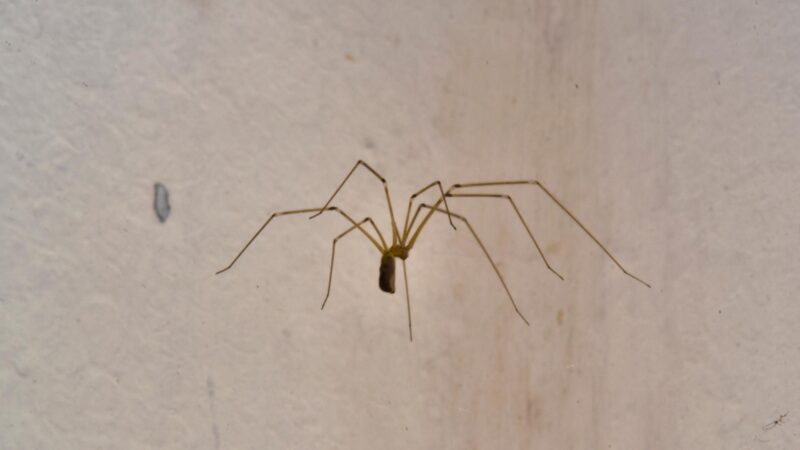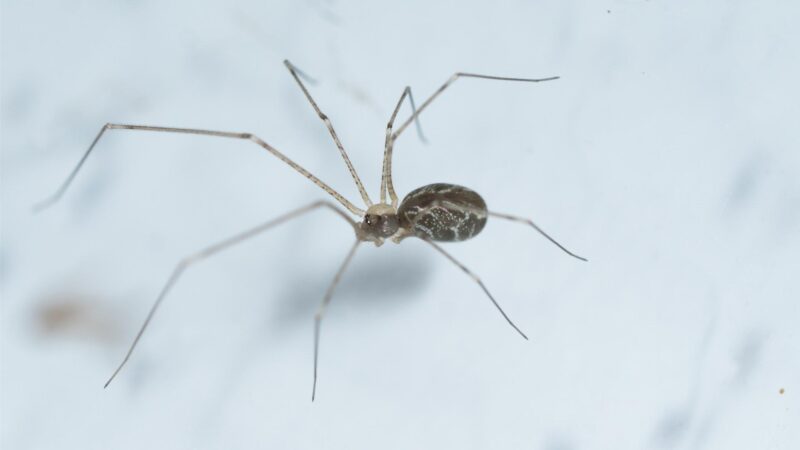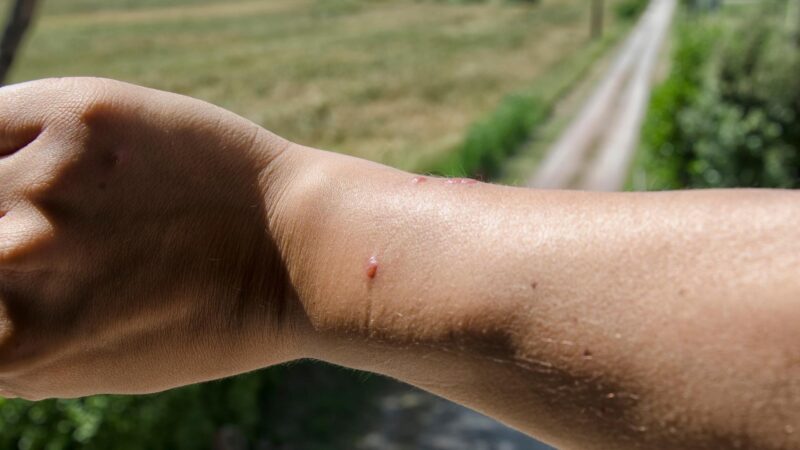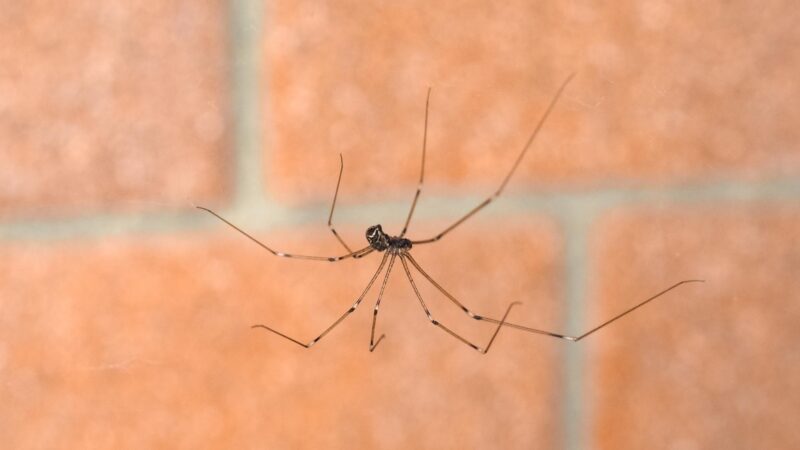Cellar spiders have exceptionally long legs for their bodies. You can find them creeping in the garages, warehouses, cellars, caves, and other dark or low light, solitary places.
Some people find them on ceilings and in the corners of the house. With their long legs, these spiders swing their bodies when they get startled. When this happens, do they also bite?
How do you treat cellar spider bites? Cellar spiders or daddy long legs are neither venomous nor poisonous, and they don’t bite people. However, to treat spider bites, soap and water should be used to clean the bitten area. It is also best to seek treatment from your doctor.
So, don’t believe stories that cellar spiders have a venomous bite. Anyway, they don’t tend to bite people. To be more familiar with these spiders, learn further about them.
Table of Contents
Cellar Spiders | Identification

Cellar spiders are also called daddy long legs since their legs are longer than their bodies multiple times. The adult female can even have legs that are 50 mm long.
Though they appear translucent, there’s a darker color around their eyes. Thus, you can see the moving blood cells on their bodies when they’re under a microscope.
The mating of cellar spiders can take hours. When it’s done, the female has the choice to store the sperms in a special cavity near the uterus. Fertilization depends on the food supply, so it means that it can take some time.
This leeway allows the female to mate with another male. Even though sperms from two different males mix in the uterus, the first batch is prioritized for fertilization.
When the female lays her eggs, she places them on her jaw which is on her body’s underside. She provides parental care for 9 days as this is the period that pre-nymph is over and the egg becomes a spider.
When attacked by a predator, cellar spiders take the chance to swing their bodies. They do it so quickly that they can’t longer be seen. It’s their brilliant way of camouflaging.
When attacking another spider, a cellar spider can jiggle the web so its prey can be in the same situation as the trapped insect. So, it’s easy for this spider to bite and eat the prey.
- Scientific Name: Pholcidae
- Appearance: Has 8 legs, very short fangs, fine gray hairs covering translucent bodies and legs
- Color: Light tan to grayish brown, pale yellow
- Lifespan: A few years
- Habitat: Chaparral, forest, mountains, rainforest, scrub forest, and taiga
- Size: 2 to 10 mm
- Diet: Insects, small invertebrates, and other spiders
- Threat: Other spiders, centipedes, wasps, small reptiles, and small mammals like shrews
- Characteristics: Solitary, not harmful
Is a Cellar Spider Poisonous?
As mentioned, a cellar spider is not poisonous. First and foremost, this species doesn’t have a poisonous gland that it can transfer through contact or ingestion. To support this statement, here are some facts about them:
- Too short fangs – Cellar spiders have fangs that are too short for biting. They are called uncate because the secondary tooth gets into contact with the fangs like a pair of tongs. Brown recluse spiders have this feature, but they have stronger muscles for biting.
- No study can prove that cellar spiders have venom toxic to humans – Though these arachnids can bite humans, the only way to prove that their venom is toxic is by injecting it through humans. However, this procedure is unacceptable to the humanitarian code of ethics and Amnesty International.
What Happens if a Cellar Spider Bites You?

Although there’s a myth that the cellar spider has strong venom, it has not yet proven to be true. There’s no such occurrence that a cellar spider has bitten a person.
What Do Spider Bites Look Like?
The majority of the spider species can’t get into the human epidermis when biting. Only a few, like the black widow and brown recluse, can do it. A spider bite looks like a mark of a puncture wound. It turns red and inflamed, but it’s sometimes unnoticed.
How Serious Is a Spider Bite?

A spider bite is harmless most of the time except if it’s done by harmful species like black widow and brown recluse. It can be compared to a bee sting that itches, swells, and turns red. Moreover, it can be painful too.
Severe wounds can appear from the bite of brown recluse and black widow. In the case of a black widow’s bite, it brings a needle prick feeling.
There will be painful cramps coming from the bitten area. Nausea or vomiting, weakness, headache, and sweating are the symptoms.
Brown recluse spiders cause minor bites but are mostly minor cases with little or no necrosis at all. A few cases have severe skin necrosis, which results in organ damage and death. Infants and children are more vulnerable to these bites.
Also, people with allergic reactions and compromised immune systems can be in hot water when bitten by these spiders. It’s best to see the doctor and especially if you have these symptoms:
- Chills, fever, and body aches
- The pain still increases after 8 hours when you got bitten
- The wound that is pale in the middle becomes purple or dark blue and is surrounded by a red ring
- The wound appears to have an open sore or skin ulcer
What Is the Best Treatment for a Spider Bite?
As stated by the University of Rochester Medical Center, antivenin is the best treatment specifically for the bite of black widows. A tetanus shot should also be administered to the patient.
Before providing these medications, the bitten area should be cleansed with soap and water. A cold or ice pack should be pressed on it.
What Are the Complications of a Cellar Spider Bite?

Since the cellar spider can’t bite into human skin, it can’t cause any health complications.
How Can I Protect Myself From a Cellar Spider Bite?
If you still feel uncomfortable about the possibility of having cellar spiders around, you can make a solution with water and essential oil. You can have eucalyptus oil or citronella oil.
Mix 5 drops of one of these oils into a cup of water. Then, dab it on your arms, legs, and face to keep insects away, including cellar spiders. You may also choose calendula ointment over these essential oils as it’s also an effective insect repellent.
Frequently Asked Questions
Which Spiders Are Dangerous to People?
There are around 200 spider species that are dangerous to people. In the US, widow and recluse spiders pose a threat. You have to watch out for 5 species of widow spiders, but the black widow causes severe reactions most of the time.
A black widow has a neurotoxin that affects the brain and nerves. Death from black widow bite is rare, but it can happen to children younger than 2 years old and adults that are above 50 years old.
There are 12 species of recluse spiders, and only 6 of them can badly affect humans. Besides the brown one, other harmful recluse spiders have colors gray, pale brown, reddish-brown, and orange. Their venom is considered a tissue poison, which means that it can seriously damage the skin around their bites.
How Common Are Spider Bites?
The Oregon Department of Agriculture stated that at least one archaeologist said that spider bites are not common.
Who Might Get Spider Bites?
A person is not likely to get bitten more than once or twice in his or her lifetime. You would likely get bitten if you get close to them, like putting on shoes with a spider in them.
What Are the Symptoms of a Spider Bite?
The symptoms of a spider bite are fever, muscle or body aches, and headaches.
How Is a Spider Bite Diagnosed?
A spider bite is diagnosed by a doctor through a person’s history and symptoms. It involves verifying if someone saw a spider that bit you, and a description of it is a big help.
Some people made mistakes thinking that they were bitten by a spider if they have skin problems from an infection, the bite of other insects, or exposure to physical agents or chemicals
Summary
Cellar spiders, with their long legs, can’t harm humans. But some still don’t like the idea of having spiders around even though they’re harmless. Some individuals are scared of their appearance.
However, you shouldn’t forget that there are dangerous spiders like black widow and brown recluse. When feeling severe symptoms after you get bitten by these spiders, it’s best to reach out to your doctor for treatment.